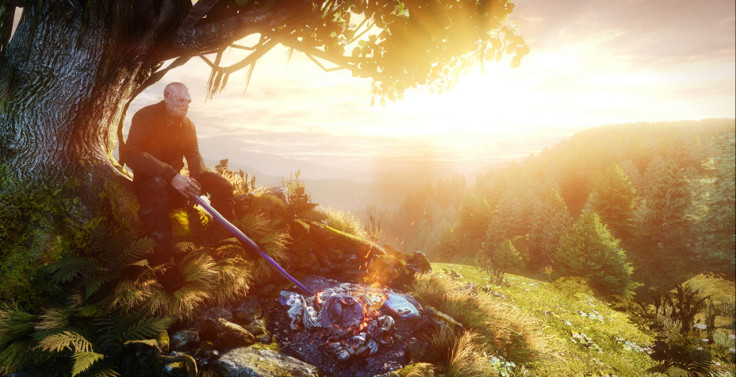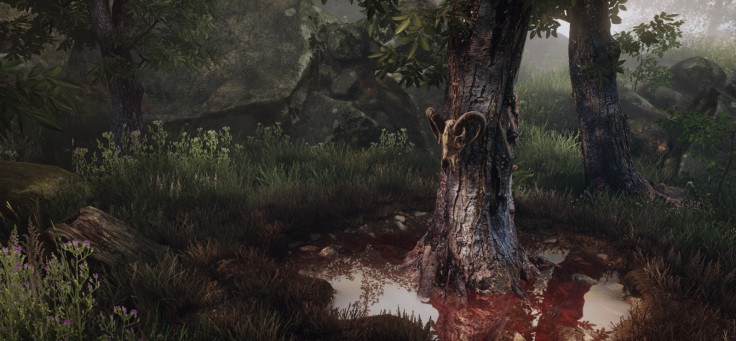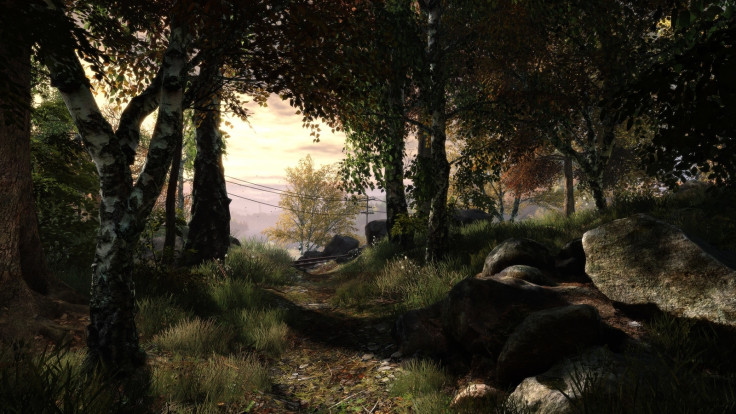The Vanishing of Ethan Carter Review: Confused Experiment in Game Narrative and Design

The Vanishing of Ethan Carter
- Developer – The Astronauts
- Publisher – The Astronauts
- Platforms – Windows PC, PS4 (launch in 2015)
- Price - £14.99
- Release date – Out now
"This game is a narrative experience which does not hold your hand." The Vanishing of Ethan Carter opens with that disclaimer and for better or worse, it sticks to its guns.
I admire Ethan Carter as an experiment, and I'm grateful to it: in the argument over directorial intent versus player freedom, this game has provided me ammunition to argue for the former. It's proof that if the developer takes a back seat, minimises his presence, and lets the audience go where it wants, the results will be confused, insubstantial, and for the large part dull.
I hate using the word "boring" to describe artwork – I feel like any art, no matter how drab, can never truly be boring, because even if you're discussing how boring it is, it's still achieved one of its key objectives: to inflame. But The Vanishing of Ethan Carter is such a slight, inoffensive, timid little game that I can't think of a better word than boring. Even the aforementioned discussion about player versus maker has been dealt with previously, and more skilfully, in games such as Journey and Dear Esther. Ethan Carter is definitely something I can keep in reserve for when that argument inevitably comes up again, but as a standalone work, it's minor – it's very childish.
But still, somehow, it's incredibly pretentious. The name is a dead giveaway - "The Vanishing of Ethan Carter." It's been chosen to make the game sound like an H.G. Wells or Edgar Allen Poe novel, two things which, incidentally, you can find stacked on a desk in one of the houses you explore.

Then there's the structure. I think The Astronauts have confused vagueness, or contrariness, with sophistication. You have access to Ethan Carter's entire open-world from the start and there are ten "scenes" for you to find and explore. You may, for example, come across a dead body and can then spend time finding the murder weapon, moving objects around and piecing together the chronology of events to decipher and display exactly what happened. Once you've found and decrypted all of these incidents, and slotted together the game's story, you hit a button and the end cutscene rolls.
It's a novel way to structure a game and, I guess, a valid response to that question about developer against player. But much of your time in Ethan Carter will be spent wandering, dismally, trying to unearth the next chip of story. The game definitely gets the "won't hold your hand" part right, but this isn't a narrative experience. "Narrative" implies direction, pacing, momentum and drama. It suggests a level of intent and rigidity, the way that a novel can only be fully understood if you read the pages in the right order. And even if you ignore those old models of narrative, and talk about games like XCOM and Dark Souls, where the story-as-written is very bare, and it's the player's actions that create the true narrative, then Ethan Carter still doesn't fit, since your interactions with the game world are sporadic and nothingy.
Activating your character's psychic ability to mentally recreate one of the murder scenes is the meat of the game, but even then it's merely a case of walking through an area, tagging which event you think occurred first, second, third etc. It's a decent interface – it's not a bad idea – but there are no narrative benefits. This isn't a game that will provide you with anecdotes. It's not systemically designed and subtly rigged so your actions create spontaneous beats of story. There are no mechanics to speak of and no substantial dialogue. That does not make a "narrative experience."

Ethan Carter wouldn't irk so much if it weren't so smug. It has no objective markers and gives no explanation about what you're supposed to be doing, and again, I think The Astronauts have gotten mixed up here. The studio has confused deliberate obtuseness with tasteful understatement; frustrating pretension with pioneering style.
What results from this purposeful lack of structure isn't a new, unbidden or interesting kind of narrative – it's the story of a character who spends much of his time sprinting back and forth in the same streets and forests, occasionally - accidentally - stumbling across a crime scene. As a matter of fact, if the idea behind Ethan Carter was to break down the barrier between developer and player, The Astronauts has failed. The sliver of narrative set-up you're given – you are Paul Prospero, ace paranormal investigator – is completely at odds with what you end up actually doing. You're not an expert detective. You're just some dickhead running around in the woods.
Back to the pretension, there's a dreadful scene at the end of the game where one the characters repeatedly uses the word "faggot" to refer to another. It's a strained, cheap and completely unearned sequence which the writers clearly thought would lend their story some gravity. Until then, the dialogue is all fairly muted and minimal. And then the homophobic slurs start and it's as if the audience is meant to take this story, about magic and ghosts and a kid with a vivid imagination, seriously, as if by throwing in some adult language Ethan Carter can suddenly become outsider art.

It's pretension at its purest, the belief that your game has the right to a scene like that just because, elsewhere, it's different and distinctive from the mainstream. The developers clearly have a high opinion of themselves and want everybody to know it, hence that disclaimer at the beginning; hence this desperate effort to appear edgy at the end. It's the kid at school who wears a blazer with swearwords painted on – it just looks ridiculous.
Adrian Chmielarz, creative lead on The Vanishing of Ethan Carter, used to work at Bulletstorm developer People Can Fly, and having interviewed him in the past, I'm aware that part of the reason he left was because he was dissatisfied with the current state of AAA videogames. Ethan Carter feels like an expression of that dissatisfaction. It's unbridled, unchecked creativity, the work of people who believe that ideas – or at least, their ideas – are foremost, and that any system that would attempt to edit them should be circumvented. Indeed, the character of Ethan Carter, our hero, is a young boy, admonished by his family for spending too much time writing short stories and drawing pictures. He is Chmielarz – he is The Astronauts.
But after finishing The Vanishing of Ethan Carter, I can't help but feel that the family had a point; that maybe self-awareness, self-consciousness and a passion for something other than one's own perceived creativity are virtues as much as imagination or self-expression. By extension, I feel like the traditions of game-making have reason to exist.

If The Vanishing of Ethan Carter is an example of what happens when you rage wholeheartedly against the machine, when you disregard the conventions of storytelling and the rules of game design, then it shows that boundaries are incredibly valuable, and that pure, idealistic creativity isn't as precious or important as it may sometimes seem.
Scores - The Vanishing of Ethan Carter:
Gameplay: 2/10 - Aimless, obscure, deliberately contrary. The developers confuse smug obfuscation with sophistication.
Graphics: 8/10 - A beautiful game featuring European architecture and lush forests.
Sound: 7/10 - The score is enjoyable but occasionally breaks the game's attempted eerie atmosphere.
Writing: 3/10 - The "narrative experience" that the game so eagerly foregrounds is minor, disjointed, and uninteresting.
Overall: 4/10 - Points for burgeoning creativity, but The Vanishing of Ethan Carter is a pretentious, misguided game, that wrongly assumes ideas should come above all else.
© Copyright IBTimes 2025. All rights reserved.






















